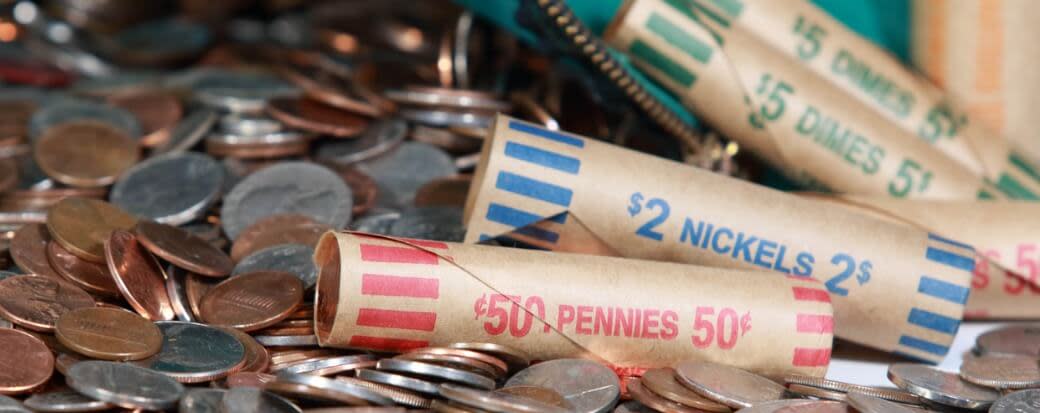How to Exchange Coins for Cash

Got a jar full of coins collecting dust? You’re not alone. Many people stash loose change and forget about it, but those coins can add up fast. Whether you’re saving up or just want to lighten your load, there are simple and efficient ways to turn your coins into cash.
Keep reading to learn more on exchanging coins for cash, including if your bank takes coins, using coin-counting machines, and how to roll coins.
Does My Bank Take Coins?
Many banks accept coins in exchange for cash or as a deposit into your bank account free of charge if you’re a customer. Typically, though, the change needs to be rolled into coin wrappers. Banks often give these cylindrical wrappers out for free, but you can also buy them in office supply stores or online.
Not many banks offer free-standing coin-counting machines anymore, though you can still find them at some credit unions and local community banks.
Wondering if your bank takes coins? Your best bet is to call your local branch to find out what their policies are regarding coin exchange (you might also want to review this policy before choosing where to open a new bank account), but here’s a look at policies at some popular U.S. banks.
Bank of America
Bank of America accepts coins at any of their financial centers, but they must be rolled.
Chase
Most Chase branches accept coins from customers, but they also are usually required to be rolled. To see if your local branch takes coins, you can use the branch locator on the bank’s website and look for “no coin transactions” (this means the branch does not accept coins).
Citizens Bank
For customers, Citizens Bank will exchange coins for cash or allow you to deposit the change into your account. They will accept loose change if it’s less than $20. Larger amounts need to be rolled.
PNC
PNC currently accepts coins at their full-service branch locations as long as they are rolled.
Wells Fargo
Wells Fargo will exchange rolled coins from their customers for free and also provides free rolls.
Recommended: Guide to Depositing Cash
Coin Counting Machines
While it’s becoming less common to offer coin-counting machines, some banks and credit unions still offer these handy tools. Before heading over to a branch with a heavy piggy bank, though, it’s a good idea to call ahead and make sure they still have a machine.
You can also find privately owned coin-counting machines (such as Coinstar) at grocery stores and other retailers. Keep in mind, though, that independent coin kiosks typically charge a fee, which can be as high as 12.9% of the transaction amount. If you're willing to accept a gift card instead of cash, you may be able to do your exchange for free.
How to Roll Coins to Exchange
Typically, banks require that change be rolled before they accept it. Here’s how to get your change ready to exchange or deposit into a checking or savings account.
Sort Coins by Denomination
The first thing you’ll need to do is dump out your receptacle of coins and sort them into denominations — or, in other words, group the change into individual piles of pennies, nickels, dimes, and quarters.
Make Piles for Each Roll
For each denomination, you’ll next need to make mini piles that contain the number of coins you can put into each roll:
Pennies: 50
Nickels: 40
Dimes: 50
Quarters: 40
Get Rolling
Once your coins are correctly counted out, you can start inserting them into your paper rolls. When you’re done, you can easily count up how much you have and bring it to your bank.
Recommended: 52-Week Savings Challenge Guide
Potential Coin Counter Fees
You can avoid going to the trouble of rolling your coins by finding a coin counting machine. Some credit unions and smaller banks have in-branch coin counters that are free to use if you’re a customer (non-customers may be charged a fee). You can also use a private coin-counting machine at a retailer, but expect to pay a relatively high fee.
Recommended: Guide to Savings Account Fees and Costs
The Takeaway
It can be a pleasant surprise to find out how much money you’ve managed to collect in loose change. Before you can exchange it into cash, however, you’ll likely need to sort, count, and insert your coins into coin wrappers. You can then take all your rolls to your local bank and exchange them for cash or deposit them into your savings account, where the money can start earning interest.
If you’re in the market for a new savings account, Lantern by SoFi can help. With our online banking marketplace, it’s easy to compare high-yield savings accounts based on annual percentage yield (APY), fees, and balance minimums.
Lantern can help you compare online savings accounts and find today’s best rate.